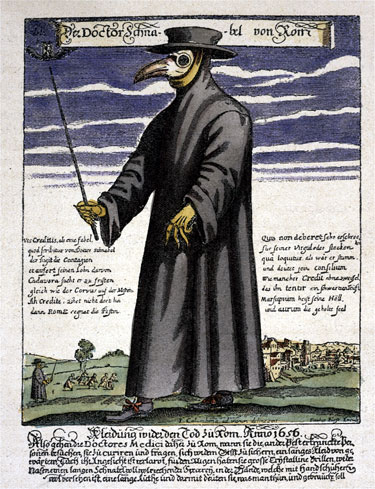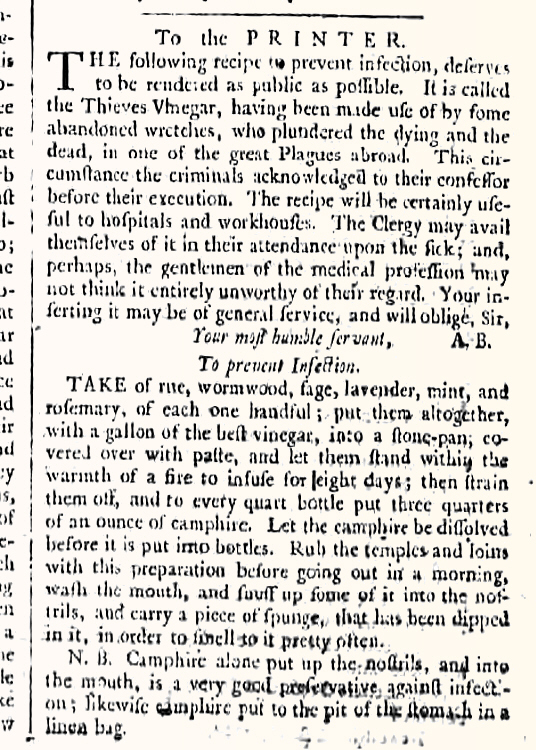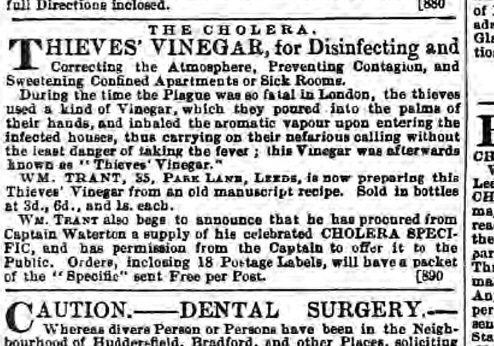

|
 (or Four Thieves, or Seven Thieves Vinegar) A vinegar infused with various herbs, commonly camphor with rue, sage, mint, rosemary, wormwood, and lavender. Thieves’ Vinegar is not traditionally a food ingredient, but a medicinal fragrancer, from a time when it was thought that diseases were spread by a ‘miasma’ of foul air. More recently, infused vinegars using the name, usually with garlic included, have become well-known as salad condiments. There are several 19th Century descriptions of Thieves’ Vinegar being supplied alongside a service of oysters, perhaps as supposed protection against the risk of infection, or maybe as a complimentary aroma after the manner of 21st Century experiential gastronomy.  A 16th Century Plague Doctor with his beak of fragrant herbs Receipts for medicinal vinegars are known from several pharmaceutical codices from the 17th Century and before. A small number are accompanied by stories along the lines of their having been devised by criminals as a prophylactic allowing them to safely burgle the homes of citizens who had fled outbreaks of plague. In various versions this may have been the 14th Century plague in Marseilles or the London one of 1665. The name ‘Thieves Vinegar’, or sometimes ‘Four Thieves’ or ‘Seven Thieves’ vinegar, or in French ‘Vinaigre des quatre voleurs’ seems to appear from about 1770 onwards. An alternative story, known only from the 1828 ‘Mirror of Literature‘, is that ‘Four Thieves’ comes from the name of its inventor, a London pharmacist called Richard Forthave. See also: A supposedly anti-plague drink.  Original Receipt in ‘The Art of Cookery, Made Plain and Easy‘ by Hannah Glasse, 1747 (Glasse 1747); Original Receipt in ‘The Art of Cookery, Made Plain and Easy‘ by Hannah Glasse, 1747 (Glasse 1747);Receipt against the Plague [In the 1805 USA edition, this appears as ‘Thieves Vinegar’] TAKE of rue, sage, mint, rosemary, wormwood, and lavender, a handful of each, bruise them together in a gallon of white- wine vinegar, put the whole into a stone pot, closely covered up, upon warm wood-ashes for four days; after which draw off (or strain through fine flannel) the liquid, and put it into bottles well corked; and into every quart bottle put a quarter of an ounce of camphor. With this preparation wash your mouth, and rub your loins and your temples every day; snuff a little up your nostrils when you go into the air, and carry about you a bit of spunge dipped in the fame, in order to, smell to upon all occasions, especially when you are near anyplace or person that is infected. They write, that four malefactors (who had robbed the infected houses, and murdered the people during the course of the plague) owned, when they came to the gallows, that they had preserved themselves from the contagion by using the above medicine only; and that they went the whole time from house to house without any fear of the distemper.  Original Receipt in the ‘The Lady’s Own Cookery Book,‘ 1844 Original Receipt in the ‘The Lady’s Own Cookery Book,‘ 1844Plague, or Four Thieves’ Vinegar. Take rue, sage, mint, rosemary, wormwood, and lavender, of each a large handful; put them into a stone jar, with a gallon of the best vinegar; tie it down very close, and let it stand a fortnight in the sun, shaking the jar every day. Bottle it, and to every bottle add a quarter of an ounce of camphor, beaten very fine. The best time to make it is in June or July.  Letter promoting Thieves Vinegar Newcastle Courant – Saturday 20 October 1770  Advertisement for Thieves Vinegar Leeds Intelligencer – Saturday 15 September 1849 For other (supposedly) medicinal drinks, see the list at.. Aqua Mirabilis  |
|
MORE FROM Foods of England... Cookbooks ● Diary ● Index ● Magic Menu ● Random ● Really English? ● Timeline ● Donate ● Royalty ● English Service ● Food Map of England ● Lost Foods ● Accompaniments ● Biscuits ● Breads ● Cakes and Scones ● Cheeses ● Classic Meals ● Curry Dishes ● Dairy ● Drinks ● Egg Dishes ● Fish ● Fruit ● Fruits & Vegetables ● Game & Offal ● Meat & Meat Dishes ● Pastries and Pies ● Pot Meals ● Poultry ● Preserves & Jams ● Puddings & Sweets ● Sauces and Spicery ● Sausages ● Scones ● Soups ● Sweets and Toffee ● About ... ● Bookshop ● Email: [email protected] COPYRIGHT and ALL RIGHTS RESERVED: © Glyn Hughes 2022 BUILT WITH WHIMBERRY |